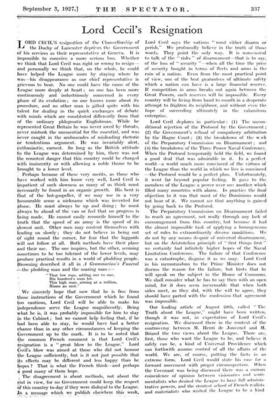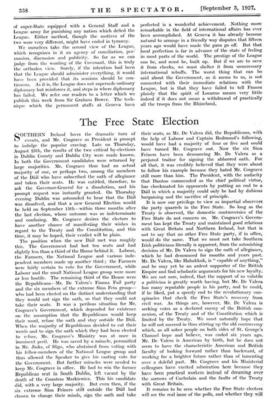Lord Cecil's Resignation
T.ORD CECIL'S resignation of the Chancellorship of 4 the Duchy of Lancaster deprives the Government of his services as their representative at Geneva. It is impossible to conceive a more serious loss. Whether we think that Lord Cecil was right or wrong to resign— and personally we think that, on the whole, he could have helped the League more by staying where he was—his disappearance as our chief representative is grievous to bear. No one could have the cause of the League more deeply at heart ; no one has been more continuously and industriously concerned in every phase of its evolution ; no one knows more about its procedure, and no other man is gifted quite with his talent for dealing in the quick 'exchanges of debate with minds which are constituted differently from that of the ordinary phlegmatic Englishman. While he represented Great Britain he was never awed by threats, never mistook the unessential for the essential, and was never caught in the ambuscades of misleading rhetoric Or tendentious argument. He was invariably alert, v`nthusiastic, earnest. So long as the British attitude to the League was determined by him, there was not the remotest danger that this country could be charged With insincerity or with allowing' a noble theme to be drought to a lower level.
Perhaps because of these very merits, as those who have worked with him know very well, Lord Cecil is inpatient of such slowness as many of us think must necessarily be found in an organic growth. His bent is that of the hot-gospeller, if we may use in a very honourable sense a nickname which was invented. for buse. He must always be up and doing ; he must always be ahead of the van or feel that no progress is being made. He cannot easily reconcile himself to the truth that the speed of an army is the speed of its slowest unit. Other men may content themselves with kading on slowly ; they do not believe in being out of sight round the corner, for fear that the laggards Will not follow at all. Both methods have their place and their use. The. one inspires, but the other, seeming sometimes to be too tolerant of the lower levels, may Produce practical results in a world of plodding people. Browning described it all in 4 Grammarian's Funeral --the plodding man and the soaring man :- " That low man, adding one to one, His hundred's soon hit.
This high man, aiming at a million, Misses an unit."
We sincerely hope that now that he is free from those instructions of the Government which he found too cautious, Lord Cecil will be able to make his independence serve the League magnificently. Being what he is, it was prObably impossible for him to stay in the Cabinet ; but we cannot help feeling that, if he had been able to stay, he would have had a better chance than in any other circumstances of keeping the Government up to the mark. It is to be noted that the common French comment is that Lord Cecil's resignation is a " great blow to the League." Lord Cecil's .blow was aimed at those who did not honour the League sufficiently, but is it not just possible that fts effects may be different and less happy than he hopes ? That is what the French think—and perhaps good many of them hope.
The disagreement is about methods, not about the end in view, for no Government could keep the respect of this country to-day if they were disloyal to the League. In a message which we publish elsewhere this week, Lord Cecil says the nations " must either disarm or perish." We profoundly believe in the truth of those words. They point the only way. It is nonsensical to talk of the " risks " of disarmament—that is to say; of the loss of " security "—when all the time the price of security bought in terms of fleets and arms is the ruin of a nation. Even from the most practical point of view, one of the best guarantees of ultimate safety which a nation can have is a large financial reserve. If competition in arms breaks out again between the Great Powers, such reserves will be impossible. Every country will be living from hand to mouth in a desperate attempt to frighten its neighbour, and without even the hope of succeeding ultimately in the calamitous enterprise.
Lord Cecil deplores in particular : (1) The uncon- ditional rejection of the Protocol by the Government ; (2) the Government's refusal of compulsory arbitration by the Hague Court ; (3) the breakdown of the w.mk of the Preparatory Commission on Disarmament ; and (4) the breakdown of the Three Power Naval Conference. When the Protocol temporarily held the field, we found a good deal that was admirable in it. In a .perfect world—a world much more convinced of the virtues of the League than the world in which we live is convinced —the Protocol would be a perfect plan. Unfortunately, it went far beyond popular feeling. It gave to the members of the League a power over one another which filled many countries with alarm. In practice the final objection to it was that most of the Dominions would not hear of it. We cannot see that anything is gained by going back to the Protocol.
The Preparatory Commission on Disarmament failed to reach an agreement, not really through any lack of encouragement from this country, but because it had the almost impossible task of applying a homogeneous set of rules to extraordinarily diverse conditions. We do not by any means despair of universal disarmament, but on the Aristotelian principle of " first things first we certainly had infinitely higher hopes of the Naval Limitation Conference. The failure of that Conference was a catastrophe, disguise it as we may. Lord Cecil in his memorandum to the Prime Minister does not discuss the reason for the failure, but hints that he will speak on the subject in the House of Commons.. We shall .consider what he has to say then with an open mind, for it does seem inexcusable that when both sides meet, as they did, with the will to agree, they should have parted with the confession that agreement was impossible.
Our leading article of August 20th, called " The Truth about the League," might have been written, though it was not, in expectation of Lord Cecil's resignation. We discussed there in the context of the controversy between M. Henri de Jouvenel and M. Briand the two views about the League. There are, first, those who want the League to be, and believe it safely can be, a kind of Universal Providence which can forthwith assume control of all the affairs of the world. We are, of course, putting the facts in an extreme form. Lord Cecil would state his case for a forward movement with proper circumspection. When the Covenant was being discussed there was a curious coincidence of opinion between visionaries and senti- mentalists who desired the League to have full adminis- trative powers, and the stoutest school of French realists and materialists who wished the League to be a kind of super-State equipped with a General Staff and a League army for punishing any nation which defied the League. Either method, though the motives of the two were very different, might have ended in tyranny.
We ourselves take the second view of the League, which recognizes in it an agency of conciliation, per suasion, discussion and publicity. So far as we can judge from the wording of the Covenant, this is truly the orthodox view. Surely, if the intention had been that the League should administer everything, it would have been provided that its sessions should be con- tinuous. As it is, the League does not supersede ordinary diplomacy but reinforces it, and steps in where diplomacy has failed. We refer our readers to a letter which we publish this week from Sir Graham Bower. The tech- nique which the permanent staffs at Geneva have perfected is a wonderful achievement. Nothing more remarkable in the field of international affairs has ever been accomplished. At Geneva it has already become natural to arrange in a friendly way disputes that fifteen years ago would have made the guns go off. But that local perfection is far in advance of the state of feeling in most parts of the world. The prestige of the League can be, and must be, built up. But if we are to save it from checks, we must shelter it from unnecessary international rebuffs. The worst thing that can be said about the Government, as it seems to us, is not connected with their immediate relations with the League, but is that they have failed to tell France plainly that the spirit of Locarno means very little indeed if it does not mean a withdrawal of practically all the troops from the Rhineland.











































 Previous page
Previous page